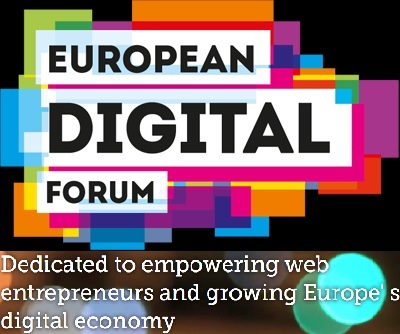 newsitems
newsitems  French EU affairs Minister Cazeneuve to EuroFora: Support to efforts for EU Integration on Telecoms+
French EU affairs Minister Cazeneuve to EuroFora: Support to efforts for EU Integration on Telecoms+
French EU affairs Minister Cazeneuve to EuroFora: Support to efforts for EU Integration on Telecoms+
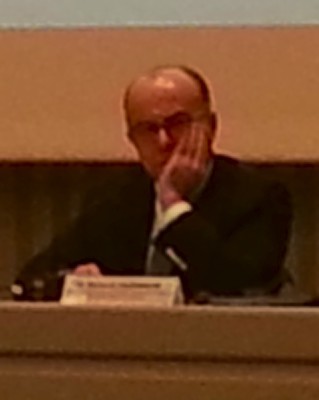
*Strasbourg/ENA/Angelo Marcopolo/-French Minister for EU affairs, Bernard Cazeneuve, speaking exclusively to "EuroFora", welcomed and expressed his support for recent efforts of EU Countries' biggest Telecom Companies, reportedly with the help of EU Commission, to negotiate ways able to overcome the current Fragmentation of Telecom Markets, still divided accross National Borders, so that Europe could, at last, benefit from a really Unified, Digital Single Market, as "EuroFora" had recently suggested by raising relevant questions to -and obtaining interesting replies from- EU Commissioners Joaquin Almunia and Noelie Kroes, in charge of Competition and Digital agenda, respectively.
The move came while Cazeneuve spoke in general for EU Institutional advances associated with industrial/financial solidarity, as well as for the Franco-German EU motor's capacity to always find adequate compromises for European Integration, preferably in cooperation also with other key EU Countries and able to stimulate the support of most or all EU Members (Comp. Infra), speaking in Strasbourg just a few Days before the forthcoming 21-22 January 2013 celebrations in Berlin of the 50th Anniversary of the pioneer "Elysee" Treaty, signed by historic Leaders De Gaulle and Adenauer.
On January 2013, StockMarkets reportedly boosted "France Telecom" and other big EU Operators' shares, after rumours that, together with "Deutsche Telecom", Spain's "Telefonika", and "Telecom Italia", they had recently met in order to discuss how to prepare a kind of "Network" unifying the currently separated National ICT Markets, as "EuroFora" had just discussed, on December 2012, with EU Commissioners Almunia and Kroes, who had reacted carefully but positively (See relevant "EuroFora"s NewsReports from Brussels and Strasbourg :http://www.eurofora.net/newsflashes/news/unifyphonemarketfordigitalboom.html ).
Meanwhile, Almunia reportedly made it clear that he hadn't yet pronounced himself in favour nor against any concrete project of EU Telcom Operators to unite together their activities in Europe, since he had to examine it seriously beforehand, (his earlier statements to "EuroFora" being of a General and prospective nature, carefuly keeping open the issue of Competition), while Kroes admitted that she had just started, after her statements to "EuroFora", to discuss with big EU Telecom Companies mainly how they might consolidate TransFrontier Investments, etc.
Even ECB's President, Mario Draghi, in recent Statements to Journalists in Frankfurt, including "EuroFora", had reminded the crucial importance that it has, in his view, to overcome any EU Market's Fragmentation.
But when the evolving prospects and/or various attempts from Big Telecom Companies of Europe to explore adequate ways for cooperation in order to reunify EU's Telecom Markets and build a strong basis for Global projects accross the World were evoked by "EuroFora" vis a vis the new French Minister for EU affairs, Bernard Cazeneuve, his reaction was clearly positive :
- "It's really a Positive development, indeed", Cazeneuve agreed from the outset with "EuroFora".
=> Therefore "we Support it", and "hope that these efforts will make further Progress"
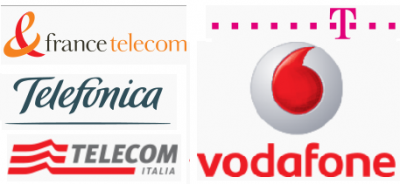
At a Global level, EU Telecom Companies, such as France Telecom, Deutsche Telecom, Telefonica, Vodafone, Telecom Italia, etc., have to face big competitors, such as ATT, China Telecom, RosTelecom and Vimpel, AirTel, etc.
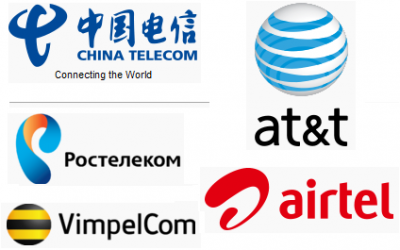
--------------------------------
- In general, it's wrong to think that France might not want, currently, any more EU Institutional developments. In fact, we are in favour of strengthening EU's Institutions, but we'd like for that to be accompagnied also by an Industrial or Solidarity move, instead of being exclusively an institutional issue alone, Cazeneuve explained earlier.
I think that we (EU) should strengthen our Integration. Whenever Europe didn't manage to find the right compromise or solution in order to advance further, it faced several problems, particularly considering the growing Global Competition. So, I'm entirely in favor of a advancing further in EU Integration, resolutely, he stresssed.
We (France) don't have any reserve at all vis a vis the prospect of a European Political Union, even of Federalist inspiration, on the condition that it has a Political content which would allow to the EU to keep its links with its People, Cazeneuve added, while speaking earlier in a Conference organized at the ENA Top Officials' School in Strasbourg,
If we (EU Countries) succeed to pull together a strong common Industrial Economic base, able to guarantee our (EU's) Capacities, instead of the current Fragmentation of EU Countries' Defence Industries, then we'd advance towards the right direction, he advised, referring to the mandate given by the latest EU Summit, December 2012 in Brussels, to EU President Van Rompuy to start preparing concrete proposals for the development of EU's common Security and Defence policy to be decided before the end of 2013, (See "EuroFora"s relevant NewsReport from Brussels on 12/2012).
-----------------
Europe can also advance forward through the institutional tool of the "Reinforced Cooperations", (which entered into force since 2010, together with EU Lisbon Treaty), together with those who are willing to do so. We've already done so f.ex. on the Financial Transactions' Taxe, and we (EU) could also do alike in future, f.ex. on Energy and other issues, etc., the new French Minister advised.
A Multi-Speed Europe, already exists in practice, and that works much better than if we had all stopped and waited those who will never come, the new French EU Minister added in reply to another Question. In general, I think that it's better to do things together with those who want to, on condition that have enough Countries with us, than to expect something from those who don't want to do nothing more, as he said.
-----------------------
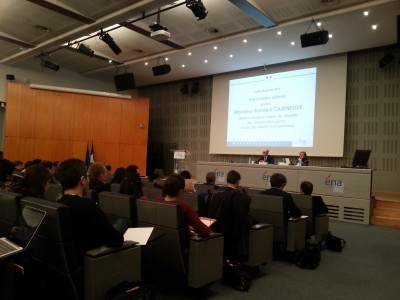
But, concerning the Franco-German relations at EU's core, Cazeneuve observed that discussions trying to bridge various natural differences at the beginning are as inscribed in its essence ("consubstantiel" at the original in French) as also their profound attachment into searching and finding always compromises, in one way or another, since Europe can't advance otherwise. It's another issue, if, sometimes, this EU core relation might be somehow "balanced" by associating also another key EU Country, and/or more "Open" to other EU Member States, f.ex. in order to guarantee their support, etc.
In this regard, he pointed f.ex. at the Mitterand - Helmut Kohl relation, revealed that even Giscard d'Estaing with Schmidt, contrary to the appearance of a rather unanimous couple, in fact had some disagreements, but had chosen "not to speak" (particularly not in public) about them, while, already, the co-founders of the Franco-German Reconciliation and Cooperation, De Gaulle and Adenauer themselves, hadn't always the same views f.ex. on the TransAtlantic relations (EU - USA), but always managed to overcome them. So thet the existence of some differences doesn't exclude at all to advance forward together, as he said.
-------------------
What happened last November 2012, when the exceptional EU Summit on the 2013-2020 Financial Perspectives didn't arrive yet to final conclusions, but decided to continue Negotiations later-on, at the beginning of 2013, doesn't occur for the 1st time : F.ex., on 1999 EU already hadn't reach an agreement neither, Cazeneuve reminded.
However, Cazeneuve expressed his preference rather for a "Checks and Balances" Institutional Architecture inside the EU (pointing f.ex. at the Power-sharing between EU Commission, EU Council and EU Parliament, etc), instead of an over-Concentration of Power in the hands, f.ex. of an omnipontent EU President alone.
-----------
Meanwhile, there is no reason to open EU's doors to all products which don't respect the Social and Environmental standards that we are accustomed to apply in our own production, he also pointed out.
As for EU Enlargement, we are in favour, if rules are respected, and a sufficiently rigorous framework exists to guarantee that Candidate Countries would have adopted the acquis communautaire of the EU.
But not to enlarge the EU without making sure that this would be done in the framework of certain Rules which will ensure that both EU's Interests and those of the candidate country will be met, Cazeneuve warned.
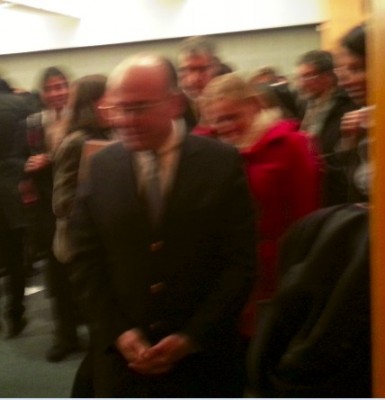
Because, Enlarge the EU without ensuring that this will be inserted in a framework which guarantees that EU's interests wil be preserved, this is an Error, he warned. On the contrary, we must also make sure that EU's principles on respect of Rule of Law, Democracy and Human Rights, Pluralism, Freedom of Expression, etc., are really applied, he topicaly added, speaking only a few days after EU Rapporteur on Turkey, Dutch ChristianDemocrat/EPP MEP Ria Oomen-Ruijten, presents in Brussels its Annual Report on Ankara's progress, or not, towards meeting EU standards, due to be soon debated and definitively voted at a next EU Parliament's Plenary sesssion in Strasbourg.
Moreover, Cazeneuve's moves came while EU Parliament's President, German Socialist MEP Martin Schulz, has just confirmed that new French President François Hollande would pay a 1st official visit in Strasbourg in order to speak with MEPs during the next Plenary session of February 2013.
-----------------------------------
***
(NDLR : "Draft News", as already sent earlier to "EuroFora"s Subscribers/Donors. A more accurate, full Final Version might come asap).
***
Main Menu
Home Press Deontology/Ethics 2009 Innovation Year EU endorses EuroFora's idea Multi-Lingual FORUM Subscribers/Donors FAQs Advanced search EuroFora supports Seabird newsitems In Brief European Headquarters' MAPs CoE Journalists Protection PlatformBRIEF NEWS
- 00:00 - 02.06.2021
- 00:00 - 18.10.2020
- 00:00 - 19.06.2020
- 00:00 - 18.05.2020
- 00:00 - 20.04.2020
- 00:00 - 02.02.2020
- 00:00 - 09.12.2019
- 00:00 - 27.11.2019
- 00:00 - 16.11.2019
Popular
- Yes, we could have prevented Ferguson riots says World Democracy Forum's Young American NGO to ERFRA
- Spanish People Elect CenterRIGHT Majority with 1st Party and Total of 178 MPs (6 More than the Left)
- Pflimlin's vision
- The European Athletic "Dream Team", after Barcelona 2010 Sport Championship Results
- Source Conseil d'Europe à ERFRA: Debatre Liberté d'Opposants à Loi livrant Mariage+Enfants à Homos ?
- Head of BioEthics InterGroup, MEP Peter Liese : "Embryonic stem cell research reaching its END" !?
- Spain: Jailed Turkish Terror suspect with Explosive,Drones,Chechen accomplices stirs Merah+ Burgas ?
- UN Head Ban Ki Moon at CoE World Democracy Forum : - "Listen to the People !"
Latest News
- EUOmbudsmen Conference 2022: Digital Gaps affect People's Trust threaten EF Project on EU Future ?
- French Election : Black Out on Virus, but Obligation for Fake 'Vaccines" Challenged
- Both French Presidential Candidates point at "Humanism" in crucial times...
- France : Zemmour = Outsider may become Game Changer in Presidential + Parliamentary Elections 2022
- PACE President Cox skips Turkey Worst (Occupation) case compared to Russia (DeMilitarisation) query
Statistics
Visitors: 56717837Archive
Login Form
Other Menu
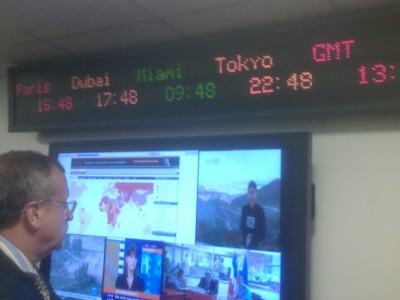
The High-Tech, brand new Crisis' management Center (CMC) inaugurated Wednesday by French Minister Bernard Kouchner, fits well EU's Humanitarian and Security-Defence aims, revealed a gathering of the largest Group of MEPs (EPP) organised in Paris these days, to prepare the debate on French EU Presidency's priorities (July - December 2008), that President Nicolas Sarkozy will present next week in EU Parliament in Strasbourg.
Due to face a large spectrum of Crises : from Humanitarian (f.ex. Natural Catastrophes, evacuation of Civilians or rapatriation of expats, populations exposed to Hunger and/or risky Sanitary conditions, etc), to various consequencies of Terrorist threats, Armed conflicts, or of Peace-keeping operations, etc, and joining Geopolitics with Diplomacy, CMC is able to deal with urgencies in real time anywhere in the world, by concentrating qualified Experts and impressive High-Tech equipment (i.e. Giant Computer Screens working in parallel, Visio-conferences, Satellite connections, etc).
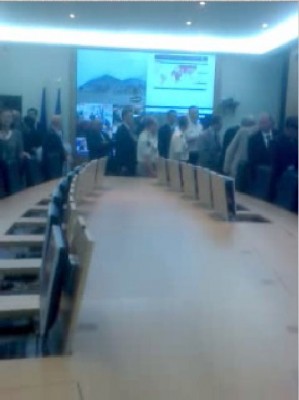
Kouchner stressed that "Humanitarian and Political considerations can co-exist in real practice, if each one respects its independence", and, speaking to EuroFora, underlined his intention to have special representatives in "Strategic" locations, creating a "Network", open particularly to European cooperation.
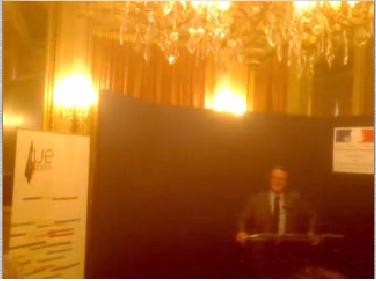
- "We must fill the gap in Europe's Civilian and Military capacities", declared earlier at Matignon, French Prime Minister Francois Fillon, while EU Commissioners met with their counterparts among French Ministers.
This point was at the focus of European People Party's "'Study Days" in Paris, from 2 to 4 July 2008, entitled : "For a Safer Europe", with a central Debate on EU's Security and Defence policies, where EU Parliament's President, German MEP Hans Gert Poettering, French Minister of Defence Herve Morin, and the Chairman of EU's Defence Committee, MEP Karl von Vogaw, spoke before meeting with Sarkozy, Wednesday afternoon.
- "We need specifically European systems, including, f.ex. Satellite networks, etc", stressed the experienced Chairman Karl von Vogaw, speaking after the meeting with President Sarkozy to European Journalists from EuroNews, EuroPolitique and EuroFora.
- And there where "European forces are already gathered, (f.ex. in Cyprus, Balkans, Lebanon, etc), if new operations started, I'd prefer to see them under European command in Future", he added, in reply to questions on how to overcome problems raised by a 3rd Countries as Turkey.
Vogaw presented earlier, at EPP's plenary, a comprehensive Report on EU's Security and Defence policy, with a strong High-Tech component (including Satellites, UAV, protected Telecoms, Strategic Air and Sea Transports, Space assets, etc), sharp references to Political will and Historic necessities, while also stressing that EU must overcome the divide between Civilian and Military research and activities, making "a close cooperation between Civilian and Military means" a "specific" mark of Europe.
The experienced Top MEP, after helping to build the "EuroZone", as a long-time Chairman of EU Parliament's Economic Committee, has recently started to chair a brand new "Security and Defence Committee", aiming to build European Defence, as the 2nd task of his life, as he told earlier to EuroFora.
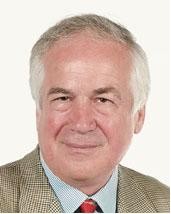
The Committee, chaired by Vogaw, will hear, next week in Strasbourg an Experts' view about on the French EU Chairmanship's priorities in ESDP on Wednesday, before President Sarkozy's plenary debate, exceptionally on Thursday.
Polls
SMF Recent Topics SA
- Record Hospitalisati... (0) by Breadman
- How Many Infected by... (1) by Thunderbird
- Real Cause for Europ... (0) by Breadman
- Interesting Australi... (0) by Aurora
- Plus de mRNA Faux-&q... (0) by Aurora
- EU: Lukashenko as E... (0) by WKalina
- Why NATO in Ukraine,... (0) by Geopol
- Afghanistan's key : ... (0) by Thunderbird
- Anti-Pass Demonstrat... (0) by Aurora
- Veran - Fioraso : Mê... (1) by JohnsonE













